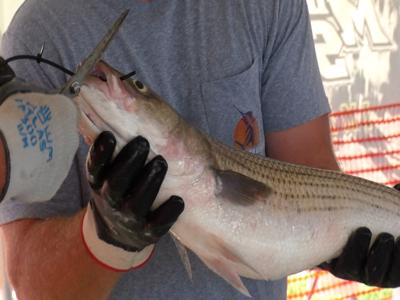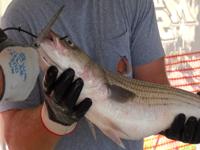TILGHMAN ISLAND, MD - Tuesday was the first day of the season for striped bass fishing for recreational fishermen.
In the past, anglers could keep any striped bass, otherwise known as rockfish, over 19 inches- as long as it was one fish per person per day. But dwindling populations brings new emergency regulations to the new season.
The Atlantic States Marine Fisheries Commission declared this emergency regulation earlier this month. Starting May 16, recreational boaters will only be able to keep a slot size of a 19 to 31-inch striped bass.
Blue skies, and the start of the season brought recreational fisherman to the boat ramp Tuesday.
John Hastings say while it would be nice to keep a fish of over 31 inches, but he respects the catch and release method.
"It would be a fun catch and it would make a great picture. I mean I'm not past throwing it back. I just like to catch them mainly," says Hastings.
One of the reasons for the 31 inch maximum regulation is because rockfish over that size are typically adult breeders. John says he's fine with whatever helps the bays future. He says, "the more breeders there are, the more of a population there is to actually catch and have a chance to catch."
Captain Shannon Pickens does still need to obey the slot size rule but he can catch two fish per day. He says this regulation on recreational fisherman is a win not only for him but also commercial fisherman.
"As a charter boat captain I'm required to do electronic reporting. So every fish that comes off of my boat is accounted for. There needs to be some accountability on other sides of the fishery as well to actually firmly determine where we are number wise," says Pickens.
Pickens went on to say, "In one essence it actually kind of deters people from throwing back a 28 to 31 inch fish in hopes for something bigger, so the pressure comes off. Here in the bay when the water temperature rises it really will do the same thing. I think its gonna help the fishery tremendously."
The Department of Natural Resources say these regulations are not permanent but they will be in place through the 2023 season. There's a possibility of the Atlantic States Marine Fisheries Commission either keeping or putting in new regulations for the 2024.



